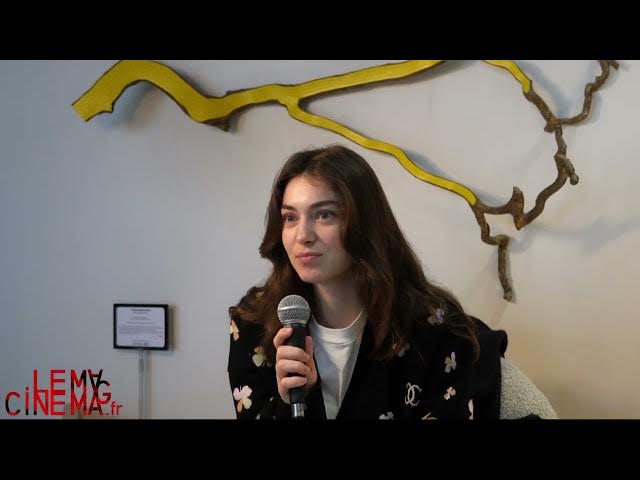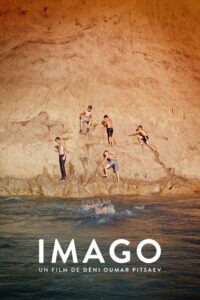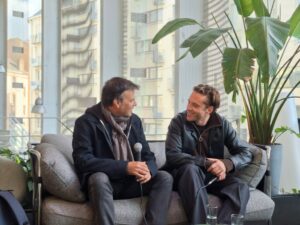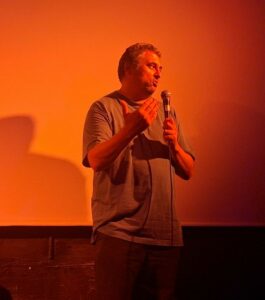On the sidelines of the Premiers Plans festival, where she was a member of the short-film jury, we spoke to the young actress Anamaria Vartolomei, who won a Cesar for the event, which also won the Golden Lion in Venice the same year.
We take a look back at her career, her aspirations for the cinema, her current and future projects, her collaboration with Bruno Dumont (soon to be in competition at the Berlinale) and Jessica Palud, for whom she plays Maria Schneider – 2 films we’re eagerly awaiting, and finally we ask her favorites for the Césars.
Hello Anamaria, you began your career in “My Little Princess”. Was there a certain mimicry between the character you played and your own life at the time?
No, not at all. I was very well prepared for the role. The casting process followed a classic structure, with the presence of Eva Ionesco. It lasted about two months in total, including several callbacks and increasingly intensive rehearsals. During these sessions, we immersed ourselves deeply in the script, as Eva insisted that I understand all the emotions to be played out and the situations that are often heavy for a child. When I arrived on set, there was no assimilation of my personal life, no distorted projection, no mimicry. I was clearly aware of my role. At the time, my life was already very healthy, with the support of my parents and a teacher who allowed me to catch up on my lessons between takes. Playing a hyper-sexualized character in an unusual situation for me was an intriguing experience. Between takes, the return to real life meant moments of relaxation, between Nintendo video games and homework.
Wasn’t your parents’ role in the story as crucial as that of Eva Ionesco’s mother, who at the time was keen for her daughter to break into show business?
There was a certain perversion in Eva’s mother’s mind, so it went beyond that. My parents, for their part, played an essential role in making sure that everything ran smoothly. They wanted to be there to prevent any deviation and ensure my equilibrium. They tried to make me understand that it was a role totally opposed to my daily life. I’d like to thank them for that, because they invested an enormous amount of time at the time. It was my first experience at the age of 10, and I didn’t really understand how a shoot worked. I remember thinking that it was all over after one day’s shooting, when in fact there were still 30 or 40 days to go, because it was a feature film! But it’s true that since I was just starting out, I was totally unaware of how the industry worked, and my parents were very helpful, because we discovered it together, and it’s obvious that with this totally outsider’s viewpoint, their advice was only intelligent and protective.
Did you already know then that you’d become an actress, or was there a little doubt in your mind?
There wasn’t even any doubt. I wasn’t thinking about it at all! The doubt came later. At the time, I wasn’t really questioning it, because I didn’t even realize it could be a profession. I was just shooting, enjoying myself enormously. In fact, that’s what made me want to do it again. After that, I was lucky enough to have an agent, and one thing led to another. The idea was to play for pleasure, and that’s still the case. However, it was in my teens that I realized that it could eventually become a profession. That’s when the doubts started to arise. When you really want something and set out on a path, doubts arise. This applies to everyone. For example, if you want to become an executive in a company, you’re bound to have doubts about your success and your skills. In the film industry, it’s even more troubling, because it’s a profession fraught with uncertainty. Even now, when you’re shooting and already have a place in the film industry, the doubts change position. You wonder whether people will still want to hear you, to see you, whether this will continue. Where before it was “Will I be able to take my place”, now it’s “Will I be able to keep my place”.
You’ve gone on to work on Riad Sattouf’s “Jacky au royaume des filles” and Tran Anh Hung’s “Ma révolution, éternité”, in a wide variety of universes… Was it easy to continue your studies on the side?
At the time, yes, because I was filming, not shooting one film after another. What’s more, it was a little parenthesis in time, and I’ve always been assiduous at school. It was important for me to have at least my baccalaureate in my pocket, and then eventually my diploma.
I was determined to get my baccalaureate and did everything I could to achieve it. I went to school with the CNED, which gave me independence and flexibility of program.
You’re on the short film jury here, a very young jury. Can we ask you about your relationship with short films? Is it a form you like and appreciate?
It’s a form I love, because it’s the beginning of cinema. In general, it’s when you discover the director’s universe, what he wants to tell, and the messages he wants to convey. However, I realize that I almost never see them. Access to short films is often difficult, with Vimeo links requiring codes, which makes access complicated if you don’t know the teams. Generally, they can be broadcast on platforms like Arte or YouTube, but on YouTube they’re not the best in my opinion. Today, we also have access to student shorts, and I saw yesterday’s that I caught up on. It’s great, they’re first films, but there’s a mastery behind them that’s fascinating, promising a flamboyant career for these young directors.
Were you surprised to be surrounded by such a young jury, and do you think that’s a good thing?
I’m 24, they’re 33 or 34, so they’re still older than me. But we’re from the same generation, so there’s no real difference. I was happy, because it helps us in our perception of films. In fact, we often agree immediately after a viewing. So far, there have been no concrete differences, and I think that’s because we’re part of the same generation, with a similar film culture and similar ideas about cinema. It makes things easier to be in the same age group.
Can we ask you about your film culture? Do your personal tastes differ from what you do professionally?
I think my culture has been influenced by an Anglo-Saxon trend, with the great American mob movies, Scorsese, Tarantino, which were quite seminal for me. I also love independent cinema, like the Safdie brothers. Making a list right away doesn’t come to mind, and I think it’s rather reductive, because often you name certain directors you want to work with. In any case, I love Romanian cinema, being Franco-Romanian myself. I worked on a second feature by Anna Theodora Mihai, produced by Christian Mungiu, with whom I’d wanted to collaborate for a long time. Raw Romanian cinema appeals to me, as do the French sensibility and the spectacular side of American cinema.
Did winning the César and receiving all this recognition along with the Golden Lion at the event bring about a change in your career, and did you feel any personal change?
As far as I’m concerned, it didn’t change anything in me. Rather, it was the Golden Lion that brought about a change, because all of a sudden Audrey Diwan and I found ourselves in the spotlight of a very renowned, cutting-edge festival. This gave the film considerable visibility, opening doors. I had the opportunity to work with an international director on a rather grandiose American production. That’s something I’d probably never have had access to without the visibility of the Venice Festival. In France, the César must certainly bring something to the table, but personally, I can’t measure the benefits. In general, I don’t think an award really changes an actor’s career. It can be gratifying for the ego and fulfill personal ambitions, but in concrete terms, I don’t know if it really changes anything.
On what criteria do you choose your roles?
My choice of roles is often like a cocktail, where three elements come together: my interest in the script, my desire to defend a character, and the understanding I have with the director. Working with someone who has a professional eye, when you feel protected and well surrounded, with a director who goes towards you and not just satisfies his personal desire, allows me to go beyond my own limits. For example, with Audrey Diwan, we worked very closely together, discussing things and looking for references, and that helped shape the character. It took a lot of upstream work, and it’s true that by the time we got to the set, we’d built up such a bond that we were on the same wavelength, heading in the same direction for the character. It’s something I like to do now, taking the time to talk with the directors I work with, so as to be more united and build a solid bond that’s reflected on the set.
Is there a particular type of role that you’re looking for today in relation to what you’ve already done, and conversely, a type of role that you shun?
At the moment, I’m open to all proposals. I’m a big believer in the natural way things come together. For example, I did the event, and then I was offered similar roles, but I didn’t want to do the same thing. And then Bruno’s film came along, and it was the perfect post-event project for me.
You’ll soon be playing Maria Schneider in a film by Jessica Palud. Is the theme of feminism something particularly close to your heart, or is it more a matter of chance?
It’s no coincidence. I firmly believe that nothing is left to chance in the choices we make. For me, an artist’s choices are an expression of his personal convictions. If my films are often described as feminist, it’s because I feel very strongly about women’s issues in my personal life. I’m instinctively drawn to strong, independent, courageous characters who try to emancipate themselves from the codes imposed by society. These themes are an integral part of my life and guide my artistic choices, as are other subjects that are close to my heart, such as class struggle and immigration.
We’ll be discovering Bruno Dumont’s Empire at the Berlinale, where the film will be in competition. How would you describe this film?
It’s a complex task, as Bruno’s films are often difficult to pinpoint and qualify. For me, Empire is a bit like a burlesque space opera, a distorted satire of society… Bruno doesn’t hesitate to provoke. His cinema constantly defies convention, playing with the codes of political correctness and exploring human cruelty and bestiality. It’s a work that perfectly reflects his unique style, inherited from his early films like “Petit Quinquin” and “The Life of Jesus”.
Before embarking on this project, did you have a clear idea of what to expect when you read the script? Were you looking forward to it, or were you a little apprehensive?
I was apprehensive, as I always am before embarking on a new project, perhaps even more so in this case, because Bruno Dumont’s world was unfamiliar to me. Before working with him, I hadn’t seen any of his films. He contacted me, and I took advice from my agent, who appreciated his work, and encouraged me to meet him. I read the script, and even though I didn’t understand much at first – because he writes in a very literary way and there aren’t even any names in front of the lines, it’s not written in a conventional way, you have to be very concentrated – I was seduced by his universe. It’s very, very crazy, it made me laugh and excited me, and I kind of threw myself into the lion’s den, trusting in his creative genius and imagination, a universe I didn’t know because I hadn’t seen those films, but which I’d heard about and seen visuals, photos and trailers too, so I figured why not!
Did Bruno Dumont explain in detail what he expected of you, or did he give you a certain amount of freedom with regard to his vision of the character?
He told me his idea, but with such a particular scenario, questions naturally arose. Bruno directs by ear, leaving some room for improvisation. He doesn’t make the non-professional actors read his script, to avoid them falling into a mechanism. This created a certain imbalance between professional (you need to read the script beforehand if you want to work on a scene) and non-professional actors on the set. But that’s what made it interesting in the end, because this dynamic brought a different rhythm, a particular concentration, and we’re never immune to what the other person can throw back at you. That’s what scared me about working with Bruno. He doesn’t intervene all the time with his earpiece. He lets the actor play, and only intervenes if, for example, he decides that we need to get out of the shot faster than planned, or if he wants us to repeat a line several times. He edits a lot, he frames a lot and he cuts a lot, so we know he can afford it, but I was constantly waiting for indications. You’re never really in total surrender, which is a bit like the Holy Grail for an actor, what you’re looking for in acting: to abandon yourself and forget yourself. With Bruno, you’re always somewhere in between, and I really enjoyed that exercise.
Have you seen the film yet?
I found it funny, intelligent, sharp and there’s a form of violence, but as I was saying earlier Bruno has a raw, baroque universe and I think that’s specific to his cinema and it’s a bit in the theme of Le Petit Quinquin or La vie de Jésus, and what he used to do in his early days, so if you like Bruno’s cinema I think you can’t help but like L’Empire, yes.
You’re going to play Maria Schneider in a film by Jessica Palud. How did you prepare for this role? Did you revisit Maria’s character?
Preparing for the role was a long process, with an initial casting call that came to nothing. Jessica had contacted me at the beginning of casting, but at the time, I had the impression that the role wasn’t for me, and that Jessica was looking for someone with the same nature as Maria, that you had to have the shoulders for it, it was a very complicated role. At the time, the script was denser. However, a year later, she called me back to say she’d like to make the film together. That was the start of a long process of research, documentation and references. We worked on gestures and mimicry, seeking a balance between fidelity to the real character and our interpretation, without falling into caricature, because although it’s an adaptation, we’re making our own image of her, we have our own way of thinking about Maria Schneider. We mustn’t let what we copy deprive us of our freedom to act. I loved working with Jessica enormously. She’s a demanding and precise director, who likes to direct actors, to accompany you rather than direct you. It was one of the first times I’d taken so much pleasure in acting, because I felt accompanied by her kindness and her exacting standards, which suited me, and it’s a role that’s so challenging! I’ve never done anything so hard in my life! Maria Schneider and I are complete opposites. Behaviorally speaking. But Maria Schneider is both the fire and ardor she has in the last tango, but also her darker side later on… It was the first time I’d played a character in the grip of drugs, so it was a challenge from start to finish. The shoot was very short, so it was very intense and quite trying. … Ah, there’s Céleste Brunnquel next door, coming to do a reading … She’s in the film with me! As I did a bit of post-sync, I saw scenes from the film, but I can’t judge and I forbid myself to do so because they’re extracts, I haven’t seen the whole film, but it’s very beautiful and the image is very nice! I can’t wait to see the result, because it’s also a subject that’s unfortunately hitting cinema and the industry at the moment, as we’ve seen with the news. I think it’s a voice that will speak for itself, and one that we need.
One last question: do you have a favorite for this year’s César for Best Emerging Actress?
I didn’t vote this year because I haven’t had a chance to see many recent films. Wait, I have to think… Ah, yes, I enjoyed Kim Higelin’s performance in “Le Consentement”. However, I’m not aware of any other female nominations. As for the men, I have a favorite: Paul Kircher, whom I loved for his role in “Le Règne Animal” and even more for his earlier performance in “Le Lycéen”, which touched me deeply and impressed me greatly. It’s a shame he wasn’t nominated for this film, I think because of the date.






Be First to Comment